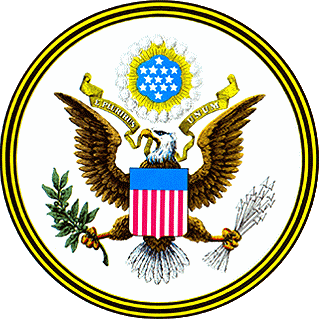1. Assurance contains sur, which sounds similar to sure, a word you use often (sentence 12). Based on what you know about this word, what can you infer about the meaning of the word “assurance”?
a. It has something to do with making you feel sure that something is true.
b. It has something to do with uncertainty.

Source: [Otakon 2009] “Flo” from Progressive . . . ads, Rob Speed, Flickr
2. What is another word in the sure word family that is connected with companies such as All State or Progressive?
a. surreptitious
b. insurance

Source: Great Seal of the US,
Wikimedia commons
3. Like you, Frederick Douglass guesses or makes an inference based on what he knows (sentence 13). He guesses that if the conductor had looked closely at his papers and seen that he was not the sailor described in the document, it could have been “fatal” for him. Several phrases in the surrounding context reinforce the meaning of fatal as “something that brings ruin or causes death.” Click on one of the phrases that Douglass uses to remind readers that this was an intense, life-or-death situation.
a. “feared they might recognize” (sentence 13)
b. “The merest glance at the paper” (sentence 9 )
a. Escaped slaves
b. Sailors

Source: Danger, Will Robinson!,
Lee Bennett, Flickr
5. Douglass explains how nerve-racking it was to be questioned or interrogated by an acquaintance who might reveal that he was not a sailor and betray him to officials (sentence 20). Next, Douglass describes the last point of “imminent danger.” Based on the overall context of “My Escape from Slavery,” “imminent” danger is
something—
a. distant
b. immediate
a. To arrest, seize
b. To anticipate especially with anxiety, dread, or fear
All complete. Great job!
